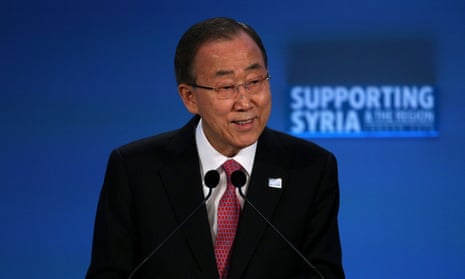Outgoing UN secretary general Ban Ki-moon has lent his support to a growing campaign for the next head of the UN to be a woman.
He told the Observer it was a “great idea”, but was reluctant to be drawn on how realistic the prospect was in an organisation that has never been headed by a woman.
In a speech he gave last Friday at Westminster’s Methodist Hall – where the first UN secretary general, Norway’s Trygve Lie, was sworn in 70 years ago this month – Ban said the UN had to get better at conflict prevention, rather than promoting peace efforts once wars were under way. This argument is often deployed by those who believe a woman would be better at steering the 193-nation organisation towards such an approach.
He claimed to be most proud of his own role in bringing more women into the UN, saying he had personally appointed “50 or 60 women” to positions in the organisation, and had made sure his team had a 50-50 gender split. But only 25% of senior roles in the UN are filled by women and only seven out of 44 of its special representatives are female.
Matthew Rycroft, UK ambassador to the UN, told the Observer it was “high time” there was a female secretary general. “I’d like to see a strong leader, able to communicate with the world’s 7 billion people, able to lead the UN, which is a disparate organisation, and able to work with the UK and others to get things done. The UK has been at the forefront of efforts to make the selection process much more transparent. It is high time for a woman to lead the UN, which is why we particularly encourage applications from women.”
Ban is expected to end his tenure, after two five-year terms, on 31 December, and the politicking has already begun to find his successor. An American pressure group, WomanSG, has been running a social media campaign that highlights well-qualified women from around the globe.
The process of electing a UN secretary general has typically involved some closed-door discussions, but the 1 for 7 Billion campaign is leading a push for a fairer, more open and inclusive selection process. The campaign was co-founded by Natalie Samarasinghe, executive director of the UK’s United Nations Association in 2013. Its formation resulted in the UN general assembly president writing to member states and asking for their nominations in writing. It is understood that there is a widespread desire in the organisation for more charismatic and assertive leadership as the world faces a period of intensely challenging conflicts.
Introducing Ban at the Methodist Hall, Samarasinghe, who is the first woman in her role, was applauded when she emphasised “she, or he” in referring to an as yet unknown successor.
Former Norwegian prime minister Gro Harlem Brundtland is now a UN special envoy on climate change and deputy chair of The Elders, the NGO started by Nelson Mandela. She said recently that, after eight male secretary generals, “the time had come” to actively consider a woman for the role. Some candidates have already been put forward, among them two women: Irina Bokova of Bulgaria, who currently heads Unesco; and Croatian politician Vesna Pusic. Four men have been suggested: former Slovenian president Danilo Turk; Serbia’s Vuk Jeremic; Portugal’s former PM António Guterres; Igor Luksic of Montenegro; and Srgjan Kerim, a Macedonian diplomat. The final appointment is likely to be decided in September, and must win the unanimous approval of the five permanent members of the security council – the UK, US, Russia, China and France.

Comments (…)
Sign in or create your Guardian account to join the discussion